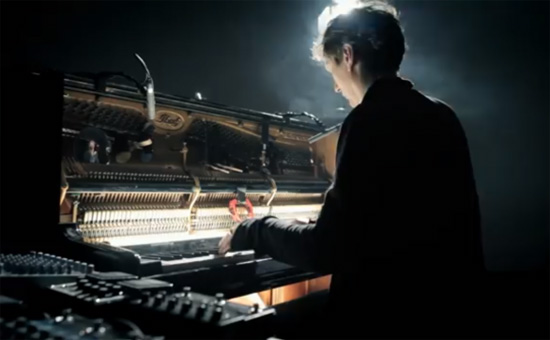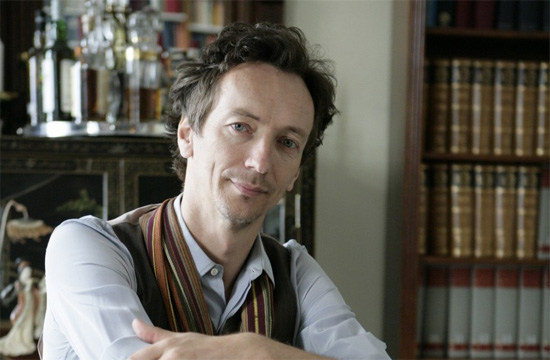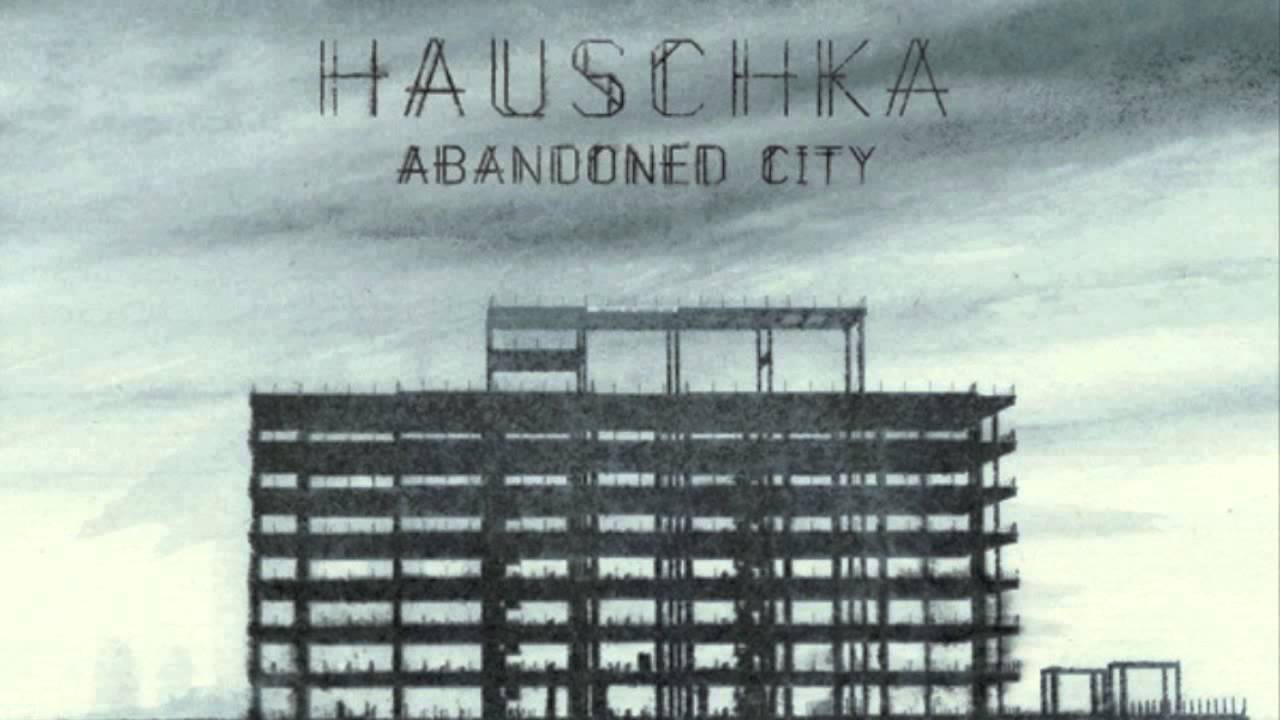The war-ravaged Agdam in Azerbaijan, the radiation-shrouded Pripyat (a near neighbour of Chernobyl), the Antarctic whaling station of Stromness, and the futuristic Sanzhi Pod City in Taiwan all have two things in common. While they are all deserted ghost towns, they are also each the name of a track from Abandoned City, the new album from German composer/instrumentalist Hauschka.
Hauschka is the nom de plume of Volker Bertelmann, a resident of Dusseldorf and world-renowned practitioner of the art (and science) of the prepared piano – of which more later. Abandoned City, his eleventh Hauschka album, is beautiful, combining elements of jazz, ambient techno, Latin rhythms and a cinematic musical sensibility into a brooding collection of widescreen instrumentals.
"I completely finished the music and was thinking about a metaphor that would fit with the feeling I had towards the sounds I had created," Bertelmann tells me when I ask him how the concept arose for Abandoned City. "When I wrote the album I’d felt lonely and sad, but there were also beautiful moments. A friend of mine had a picture of a parking garage in Las Vegas, which is on the cover of the record. It’s an abandoned building – and I began to have this sense that abandoned places have a sadness about them, but they can be very beautiful, either in their structure or as nature begins to reclaim them. I began to dig and this theme escalated to abandoned cities."
We meet over a shaky Skype video link. Bertelmann is in a plush-looking Berlin hotel and seems happy to hear that I’d spent a fascinating hour on Google searching the histories of the towns name-checked on Abandoned City. "Once I decided to name the pieces after abandoned cities, I was trying to find a way of getting some diversity. You can quite easily find tragic cities decimated by war or catastrophe and suddenly you can get in a very serious spot. So, I tried to open the album up to funny cities as well – Thames Town in China [a bizarre, and failed, attempt to create a quintessentially English village on the outskirts of Shanghai] seems pretty crazy to me. Sanzhi Pod City is very interesting because it looks almost post-apocalyptic, from a science fiction film, and it has just been left as it is – in the jungle – as no one wanted to live there. I wanted to look at what makes abandoned cities attractive and weird."
As a concept it works – Abandoned City is by turns dark and eerie, playful and luminous. "I love mathematics and am a very analytical person, but I also love the chaos and spontaneous impact these songs have," Bertelmann reveals about the album, which was largely recorded over a ten day period during a creative burst brought about by the birth of his third child. "I’m a character that’s looking for inspiration – I love sitting in cafés and thinking about the world. So, for me, having kids meant I really had to be focused. I was feeling pressure to do something in two hours that I would normally do in a week. I wasn’t sure how I’d even accomplish a record, but when I opened the door it was like a big swarm. I was so happy and amazed at what came out after only ten days of work."
What makes Abandoned City all the more impressive is that every sound on the album was created on a standard piano, using the ‘prepared piano’ technique, mastered by Bertelmann over the last decade. "A prepared piano is a method that involves taking a piano sound and adding an object – it could be metal or felt or plastic – to a piano string or between the hammer and the string to create a new tone on top of the piano note," Bertelmann explains. "By using the prepared piano method, I get to use every single element of the piano, which gives me the freedom to do very modern, almost electronic, sounding music without using electronics as a sound source. On Abandoned City I used only delays with a little distortion to process the sound – everything you hear was played on a piano."
So it transpires that the jagged percussion patterns on ‘Elizabeth Bay’ (a disused Namibian mining town) were created by jamming wooden sticks between the piano strings, while Bertelmann achieved the brittle clang of ‘Pripyat’ by blocking strings with his fingernail. This ambitious dedication to craft such an array of sounds – be it an imagined harp, drum or even a Melodica – using such simple, yet imaginative, techniques ensures Abandoned City carries a sense of wonder and intrigue.
Volker Bertelmann grew up in the small German village of Ferndorf. After excelling on the piano as a child, and having dropped out of medical school just before his graduation, his first foray into music was in the mid-1990s via a hip hop band, God’s Favourite Dogs. After scoring a couple of minor hits and touring with "the very famous" German hip hop band Die Fantastischen Vier, God’s Favourite Dogs were dropped by their record label.
"After that experience, I decided that I didn’t want to write any more music that had form or vocals," he reveals, taking up the back story of Hauschka. "I wanted to be responsible for my own sound. I was trying to find a way to make music that was interesting to me. I started with electronic music, and at that time [German] artists like Oval and Mouse On Mars were producing awesome soundscapes. I was completely inspired by the sound."

However, it wasn’t long before Bertelmann reverted back to his beloved piano. "I changed to piano, but I didn’t want to get away from the electronic sounds, and I also didn’t want to use a computer on stage. I needed a way of working on something that gave me limitless ability to use sounds inside of a piano. I was recording an album in the Brecon Beacons in Wales when I first tried to make a sound using some foil from a Christmas cake package. I put the foil between the hammer and the strings and it created a hi-hat sound. I realised that if I could do that with one string, I could do everything on every string. That’s how my ‘prepared piano’ started. I then discovered the works of [prepared piano pioneer] John Cage, who had done all this much earlier, and I’m very happy that I now know his music theory."
After a debut Hauschka album (2004’s Substantial), the newly acquired technique was unveiled on The Prepared Piano the following year. Several further albums have followed, including 2008’s wonderful love letter to his childhood village (Ferndorf) and 2012’s Silfra an illuminating collaboration with the American violinist Hilary Hahn. And while Bertelmann may have access to such notable classical musicians as Hahn, he still harbours a deep love of urban dance music. "I was always an R&B and hip hop person. I’m a big fan of bass and slow, driven beats. So, for example, if you listen to ‘Thames Town’, it was completely inspired by something like those early wild and crazy M.I.A records."
It appears that Abandoned City is the first step of a busy and diverse year in Hauschka’s flourishing career. Bertelmann talks about forthcoming opportunities to work with symphonic orchestras, and is animated in his desire to record an album with Múm drummer Samuli Kosminen, after the pair collaborated together on Hauschka’s Salon Des Amateurs album in 2011.
In 2012, Bertelmann wrote the score for the Doris Dörrie-directed film, Glück. The music of Hauschka seems a perfect fit for cinematic scores, and he does admit finding himself "gravitating towards film soundtracks." Indeed, the reason for the visit to Berlin is to attend the city’s Film Festival, which is featuring a film he’d scored – Praia Do Futuro – the first film by Brazilian-Algerian director Karim Aïnouz to include original music. Bertelmann also reveals that he will be providing the soundtrack to 2015’s The Boy, which – and I’m quoting directly from IMDb – "is an intimate portrait of a nine-year old sociopath as he discovers his first taste for killing." Nice.
But before that, Hauschka will tour the magnificent Abandoned City. I tell him that I’m still ever so slightly incredulous at the notion that every sound on the album originates from a humble piano. "The funny thing about it is that when the listener hears it they wonder how the sounds are made, as people are not sure if what they are listening to are samples," Volker says with a knowing glint in his eye. "That makes me very happy, as it means I don’t need to search on a computer for a new sound library – I am creating one with my craftsmanship."
Hauschka’s Abandoned City is out on 17th March via Temporary Residence Ltd.



